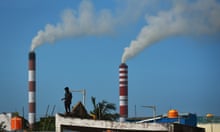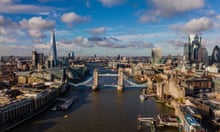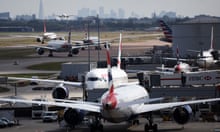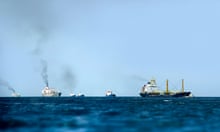Ships calling at the UK’s most-polluted ports produce more nitrogen oxides than all the cars registered in the same cities or regions, analysis has shown.
A report from Transport & Environment (T&E) said that ships were continuing to discharge huge quantities of air pollutants at ports, with Milford Haven, Southampton and Immingham topping the list for emissions of harmful sulphur oxides and fine particulate matter (PM2.5) as well as nitrogen oxides (NOx).
The NGO said the data underlined the urgent need for government action to ensure ships used cleaner fuels and that ports enforce more zero-emission technology such as shore-side electricity.
Shipping and ports representatives said the report used “flawed methodology” and disputed the comparisons, but said they supported moves to reduce pollution.
The report found that in the top 10 NOx-polluted ports, about 4,000 ships produced an estimated 1.75 times as much NOx as almost one million cars registered to the same areas.
Ships calling at Southampton, a major cruise ship port, produced four times more NOx than cars in the city, T&E said. Southampton was also the worst for PM2.5, with cruise ships responsible for more than half the particulate pollution.
Jonathan Hood, the UK sustainable shipping manager at T&E, said: “The awful levels of pollution revealed in this analysis demonstrate how the UK’s port cities are being choked by the harmful fumes caused by a shipping industry that, thanks to years of government inaction, has no impetus to change.
“The government has its last chance to chart a better course for the industry with the updated clean maritime plan and it must not waste this opportunity. We need to see a rapid switch away from filthy fossil fuels, and ports must set binding targets to implement zero-emission technologies. These must include shore side electricity, which would ensure ships can plug in at port and switch off their polluting engines.”
A UK Chamber of Shipping spokesperson said the report did not take account of shore-side power now being used in Southampton by cruise ships, improving the air quality, but admitted that the UK was “behind the curve” and that more facilities should be installed.
The spokesperson added: “The industry supports the ambition to reduce emissions and is investing billions worldwide to do so. A long-term plan, codesigned by industry and government, is the way to set out the clear roadmap for emissions reduction [and] unlock future investment.”
after newsletter promotion
Mark Simmonds, director of policy at the British Ports Association, said the industry’s net zero targets would also improve air quality. But he said the report was “irresponsible” and “discredited” by not examining how emissions dispersed before affecting population centres.
“Air pollutant emissions have a very localised impact and comparing emissions from ships, which deliver 450m tonnes of goods a year including half our of food and energy, to local car journeys is absurd. Emissions from ships are limited while at-berth when the main engines are turned off,” Simmonds said.
Lord Deben, the former chairman of the government’s Climate Change Committee, said it was “disheartening to see the staggering levels of emissions from ships around UK ports” and said the government should prioritise stricter emissions control measures. He said: “Without decisive action, the health impacts for residents and workers in port towns, not to mention economic costs, will continue to soar.”
A Department for Transport spokesperson said the UK would be publishing an updated clean maritime plan for shipping as part of its 2050 net zero targets. The spokesperson said: “We’ve already invested over £200m to develop innovative technology that will decarbonise the industry [and] are currently looking at extending emission restrictions across our waters after their success in the North Sea.”










